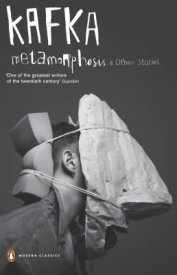I'm making my way through a collection of Kafka stories in a leisurely pace - almost by default, since I decided to read him in German (seeing as how people always complain that he loses a lot in translation).
And it's an experience. I've read these stories before, but it was years ago, and one thing that didn't really strike me was Kafka's language; dry, descriptive, but always correct and rarely emotional. I definitely think you can draw parallels between Kafka and Lovecraft in theme (they were contemporaries, they both wrote about a world where the very fabric of reality seems unreliable at best and evil at worst, both seemed highly sceptic of the modern world and its advances, both were quite pessimistic about their abilities to get out of this world alive, so to speak) but where Lovecraft's monsters cause his anti-heroes to go insane and babble in long sentences containing a multitude of adjectives (most of which are about how they are unable to describe their horror, just trust us, it's HORRIFIC) Kafka is bone-dry. It's prose worthy of an insurance clerk; he tells us exactly what's happening, often in words with slight double meanings, but completely objective: Gregor Samsa turns into a vermin, accept it. No one is really surprised - horrified, yes, inconvenienced, yes, but not surprised. No one tries to solve the problem. They are characters adrift in a Wrong world, and Kafka never gives us any hints on how we're supposed to read it. Hell, even
comes in the middle of a block of text, blink-and-you'll-miss-it.
He, like, creeps me out, dude.


